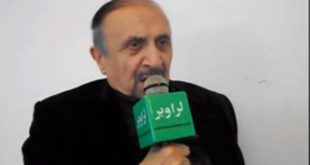When news of the assassination of Ahmad Shah Massoud reached the Western world, a resurgence of press accounts of his military acumen and prowess were exhumed. Celebrated in song and story, Massoud was the modern incarnation of the classic resistance leader as immortalized by Hemingway’s ‘For Whom the Bell Tolls’ or Ken Follett’s ‘Lie Down with Lions,’ novels written in the classic guerrilla war genre. Deified by the French press as a cunning military tactician, the result of bold and daring raids on Soviet convoys launched from mountainous redoubts high above the Panjshir Valley, Massoud became the media-icon of the Afghan Resistance. But some question the political orientation of the respective correspondents as well as the veracity and objectivity of their interpretations. Were the reports factual or merely triumph of symbolism over substance?For a number of Afghans and journalists however, the motive-force behind Massoud’s death is incontrovertibly linked to political machinations, espionage, treason, subversion and the enduring lure of retribution.
Eric S. Margolis, Toronto Sun foreign affairs editor and author of War at the Top of the World and The American Raj, Liberation or Domination, Resolving the Conflict between the West and the Muslim World had this to say about Massoud’s military record in a recent article for the Afghan Post, dated 10/23/01 and titled Spare us the Nation Building:
‘Massoud was adored by the Western media and was being groomed by Russia (his foreign backers) as the next leader of Afghanistan. Few outsiders knew that the dashing Massoud was regarded as a traitor by many Afghans for allying himself with the Soviets during the war and turning against his fellow Mujahideen.’
In a corroborating piece titled Ex-Soviet Commander Unveils Massoud’s Secret Pact, Weekly Mirror International, 5/23/01, correspondent Sami Yousefzai quotes Boris Gromov, former commanding general of the Soviet 40th Army Afghanistan: ‘The army of famed Jihadi Commander Ahmad Shah Massoud could convert the area into a graveyard for the Russian troops by only throwing rocks.’ The Soviet general went on to say that: ‘they immediately met with Massoud and signed an agreement with him in 1982* that ensured safe passage for the Russian Army through the precipitous and dangerous Salang Pass and Panjshir Valley and thus onward to the southern and eastern areas of Afghanistan and that Massoud sometimes staged sham skirmishes with the Russians to put off chances of suspicion about his activities among other Mujahideen groups.’ Massoud’s agreements with the Soviets remained in effect for the entire duration of the war. Many Afghans view Massoud’s consort with Russia as prolonging the
decade-long war and as a precursor for the following civil unrest.
Arab Connection:
In the wake of the terrorist attacks on America, it has been a relatively easy matter for the media and those seeking political advantage to attribute acts of terrorism to the al-Qaeda network. Indeed, based on information obtained from Northern Alliance sources, one newspaper reported that ‘the death of Massoud was a gift to Taliban leader Mullah Omar from Osama bin Laden.’ But here we must be circumspect; the alleged role of suicidal Arabs in the death of Massoud raises more questions than answers. First, in hopes of eliciting US diplomatic and military support for their war against the Taliban, the Northern Alliance quickly learned to exploit the anti-Taliban atmosphere by posturing as victims of Osama bin Laden’s terrorist activities. Secondly, Sayed Ibrar, former Chief of the national carrier Ariana Afghan Airlines, and Dr. Wadir Safi, Minister of Civil Aviation, informed me during a 1997 interview while in Kandahar that: ‘Massoud had smuggled arms aboard the national carrier Arian Afghan Airlines to Somalia warlord Muhammad Farah Aidid between 1992-1995, for which he received a ten-million dollar payment from Osama bin Laden.’ The payment was witnessed by well-respected resistance figure Brigadier Rahmatullah Safi.
Noteworthy as well, is the granting of Afghan citizenship to 837 members of al-Qaeda by Massoud and his titular boss Burhanuddin Rabbani during their administration. But for many of us, the most telling facts that militate against Arab participation in Massoud’s death are the passions known to motivate Arab suicide missions and for which Massoud had no known link:
- Israeli occupation of Gaza and West Bank, (2) unconditional US support of Israel, (3) US bases in Saudi Arabia and (4) the US bombing and sanctioning of Iraq, (5) and the ever-present anti-Islam bias incorporated in US foreign policy decisions.
An internal power struggle cannot be dismissed. Two-weeks prior to this death, Massoud entered into a power sharing arrangement with the Taliban. Muhammad Fahim, former Deputy Director of the Afghan KGB (KhAD) and Massoud’s successor, met with Russian Defense Minister Ivanov to voice his objections over the plan. Ivanov stated in unequivocal terms that: ‘Russia would not under any circumstances accept a power sharing agreement with the Taliban.’
In the view of many area specialists and Afghans, there is ample circumstantial and anecdotal evidence to conclude that a person or persons unrelated to al-Qaeda were involved in the assassination of Ahmad Shah Massoud. For example, recently it has been discovered that Abdul Rasul Sayyaf provided the stringent, required security clearances for the alleged-assassins to gain audience with and proximity to Massoud.
During June of 2007, Masood Khalili told the Indian press that just prior to the explosion that took the life of Ahmad Shah. He observed ‘a bright streak of light, the tell-tale exhaust signature of a missile in flight coming towards the building.’ As sole survivor, Khalili’s reconstruction of events lends credibility to the hypothesis that someone close to Massoud engineered his assassination.
Bruce G. Richardson
Notes:
*A plethora of evidence exists that demonstrates that the late Ahmad Shah Massoud’s accommodations with the USSR began as early as 1980.
 لراوبر ویب پاڼه لراوبر يو افغان – تازه خبرونه
لراوبر ویب پاڼه لراوبر يو افغان – تازه خبرونه


